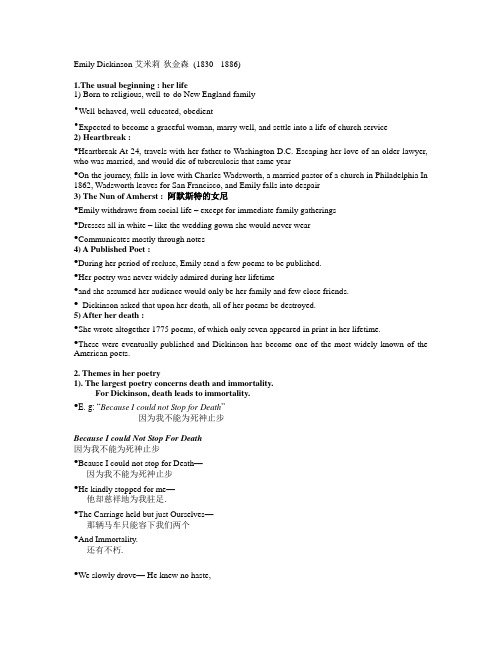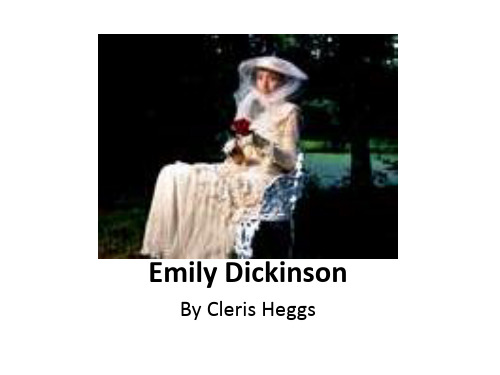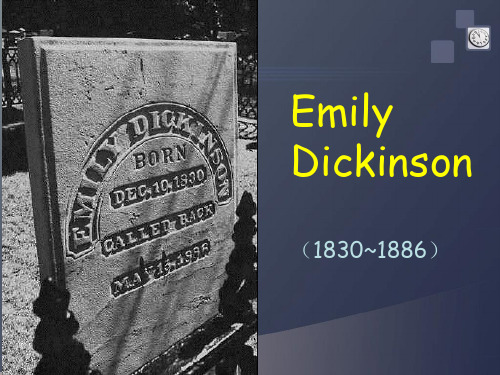Emily Dickinson
- 格式:ppt
- 大小:211.50 KB
- 文档页数:13

①I’m Nobody!我是无名之辈-Emily DickinsonI’m nobody! Who are you?我是无名之辈!你是谁?Are you nobody, too?你也是无名之辈吗?Then there’s a pair of us----don’t tell!那么我们就是一对儿了!千万不要透露出去They’d banish us, you know!不然我们都会被他们驱逐,你知道。
How dreary to be somebody!做一个某某,是多么沉闷无聊How public, like a frog众人像是青蛙To tell your name the livelong day整日地把你谈论啊To an admiring bog!对着他们倾慕的泥沼我是无名之辈艾米莉·狄金森我是无名之辈,你是谁?你,也是,无名之辈?这就凑成一双,别声张!你知道,他们会大肆张扬!做个,显要人物,好不无聊!像个青蛙,向仰慕的泥沼——在整个六月,把个人的姓名聒噪——何等招摇!This poem is Dickinson’s most famous and most defense of the kind of spiritual privacy she favored, implying that to be a Nobody is a luxury incomprehensible to a dreary somebody—for they are too busy keeping their names in circulation. But to be somebody is not as fancy as it seems to be.Emily DickinsonAs you probably noticed when you read this poem, none of the themes that I discussed in the Overview of Dickinson applies to this poem. My list was not meant to cover every topic Dickinson wrote on, nor does every poem she wrote fit neatly into a category.Dickinson adopts the persona of a child who is open, naive, and innocent. However, are the questions asked and the final statement made by this poem naive? If they are not, then the poem is ironic because of the discrepancy between the persona's understanding and view and those of Dickinson and the reader. Under the guise of the child's accepting society's values, is Dickinson really rejecting those values?Is Dickinson suggesting that the true somebody is really the "nobody"? The child-speaker welcomes the person who honestly identifies herself and who has a true identity. These qualities make that person "nobody" in society's eyes. To be "somebody" is to have status in society; society, the majority, excludes or rejects those who lack status or are "nobody"--that is, "they'd banish us" for being nobody.In stanza 2, the child-speaker rejects the role of "somebody" ("How dreary"). The frog comparison depicts "somebody" as self-important and constantly self-promoting. She also shows the false values of a society (the "admiring bog") which approves the frog-somebody. Does the word "bog" (it means wet, spongy ground) have positive or negative connotations? What qualities are associated with the sounds a frog makes (croaking)?Is there satire in this poem?Some readers, who are modest and self-effacing or who lack confidence, feel validated by this poem. Why?②To Make a Prairie…To make a prairieIt takes a clover and one bee,One clover and a bee,And revery.Revery alone will do,If bees are few.去造一个草原张祈试译去造一个草原需要一株三叶草和一只蜜蜂,一株三叶草和一只蜜蜂,还有梦。


Emily Dickinson艾米莉·狄金森(1830 - 1886)1.The usual beginning : her life1) Born to religious, well-to-do New England family•Well-behaved, well-educated, obedient•Expected to become a graceful woman, marry well, and settle into a life of church service2) Heartbreak :•Heartbreak At 24, travels with her father to Washington D.C. Escaping her love of an older lawyer, who was married, and would die of tuberculosis that same year•On the journey, falls in love with Charles Wadsworth, a married pastor of a church in Philadelphia In 1862, Wadsworth leaves for San Francisco, and Emily falls into despair3) The Nun of Amherst : 阿默斯特的女尼•Emily withdraws from social life – except for immediate family gatherings•Dresses all in white – like the wedding gown she would never wear •Communicates mostly through notes4) A Published Poet :•During her period of recluse, Emily send a few poems to be published.•Her poetry was never widely admired during her lifetime•and she assumed her audience would only be her family and few close friends. •Dickinson asked that upon her death, all of her poems be destroyed.5) After her death :•She wrote altogether 1775 poems, of which only seven appeared in print in her lifetime. •These were eventually published and Dickinson has become one of the most widely known of the American poets.2. Themes in her poetry1). The largest poetry concerns death and immortality.For Dickinson, death leads to immortality.•E. g: ―Because I could not Stop for Death‖因为我不能为死神止步Because I could Not Stop For Death因为我不能为死神止步•Beause I could not stop for Death—因为我不能为死神止步•He kindly stopped for me—他却慈祥地为我驻足.•The Carriage held but just Ourselves—那辆马车只能容下我们两个•And Immortality.还有不朽.•We slowly drove— He knew no haste,我们徐徐而行—他不慌不忙. •And I had put away•My labor and my leisure too我也把我的劳与闲统统丢掉一边,•For His Civility —为了他的礼让—•We passed the School where Children strove 我们路过学校,孩子们你推我搡,•At Recess —in the Ring —在休息时间,在圆形广场•We passed the Fields of Gazing Grain—我们走过在田间凝眸的麦田—. •We passed the Setting Sun—我们路过夕阳-•Or rather— He passed Us—或毋宁说,他走过我们身旁•The Dews drew quivering and chill—寒露降,身子冻得打颤•For only Gossamer, my Gown—因为我只披着薄纱长袍—•my Tippet —only Tulle—我的披肩如丝网•We paused before a House that seemed 我们停步在一所房子前•A swelling of the Ground—那是隆起的土地一片—•The Roof was scarcely visible—屋顶几乎看不见—•The Cornice —in the Ground—屋檐—在地里—•Since then — `tis Centuries— and yet离那时—已是几个世纪—然而•Feels shorter than the Day感觉却比一天还短•I first surmised the Horses' Heads•我开始猜想着马车•Were toward Eternity—•正驶向永恒—该诗的核心意象是通向永恒的生命旅程.Journey of life:•the School--childhood•the Field --adult/maturity•the Setting Sun - old age•the grave - end of life’s journey-death--EternityDetailed analysis of the poem•The first line hints that death is not the final stopping place or terminus of existence.•i had...too:figuratively I put behind me the labour and toil of worldly existence. Literally, as a courteous passenger she puts aside her work, possibly her knitting ("labour") and gives all her attention to the coach driver (Death).•where...ring: they pass children at playtime ("recess") actively engaged in playing a game (symbolic of the world, and/or of meaningless worldly striving).•fileds of gazing grain: cornfields,perhaps suggestive of harvest, or the cycle of the seasons, the natural world she is leaving behind. ("Gazing" is nicely alliterative but difficult to explain to expain-may mean simply something gazed at through the carriage window).•The dews: in the English culture, drew is traditionally associated with transience and also, because of a dew-drop's pearl like shape, with the soul.•My tippet only tulle:my fur was only soft fine silk (I wore little to protect me from the cold). •We...ground: a grave or tomb. ("paused"implies that burial in a grave signfied no more than a temporary restinplace before the soul attends to heaven).•Since then 'tis centuries:time is meaningless in terms of eternity,and therefore it seems no time at all since she first suspected("surmised")that the horse drawing Death's carriage were heading for Eternity. •"Surmised"is a beautifully apt word in this context because it tactfully suggeste something less than a certitude, but someting more than guess or conjecture-the sound of the word with its long drawn out second syllable counts for a good deal here(possibly about Cortez the explorer first viewing the continent of South America:"...and all his men Look'd at each other with a wild surmise..."). •Other poems dealing with death:•My life closed twice before its close在我生命结束之前已经结束过两次•I heard a fly buzz—when I died我死时听到了苍蝇的嗡嗡声She began to conceive of the process of dying.2). She regards nature as both kind and cruel•Extol the magnificence of sunrise in ―I’ll tell you how sun rise‖我将告诉你太阳如何升起,•In the meantime, reveal the cold indifference of nature.•In ―Apparently with no surprise‖显然地并无伴随惊讶, Frost kills a happy flower without being punished while both the sun and God look on.3). On the ethical level she emphasizes free-will and human responsibility.•In ―To fight aloud‖•The individual’s highest duty is to resist anything that will do harm to man’s self-respect and spiritual heritage.4). Like Emerson, she holds that beauty, truth and goodness are ultimately one.•In ―I died for beauty‖(我为美而死), discusses beauty and truth, concludes that the two are one.I Died for Beauty— But was scarce•I died for Beauty — but was scarce我为美而死—但还不怎么•Adjusted in the Tomb适应坟墓里的生活,•When One who died for Truth , was lain这时一位为真理而死的人被安放在•In an adjoining Room —隔壁墓室里—•He questioned softly"Why I failed?―他柔声问:―我为什么而亡?‖•"For Beauty ",I replied —―为了美‖,我回答说—•"And I — for Truth — Themself are One —―我—为了真理—美和真是一样的—•We Bretheren, are", He said —我们两是兄弟‖,他说•And so, as Kinsmen, met a Night —就这样,像亲人在夜里相遇。



艾米丽迪金森艾米丽迪金森(Emily Dickinson,1830年12月10日- 1886年5月15日)是一位美国著名的诗人,被誉为美国文学史上最重要的女性诗人之一。
她的作品以其独特的风格和思想深度而闻名,被广泛认为是美国现代诗歌的奠基人之一。
艾米丽迪金森出生在马萨诸塞州的阿默斯特市,是一个富裕家庭的长女。
她的父亲爱德华迪金森是一位成功的律师和政治家,她的母亲艾米莉诺诺里斯迪金森是一位贵族出身,有一定的文化修养。
艾米丽在一个充满爱与关怀的家庭环境中长大,她的父母鼓励她追求知识和表达自己的想法。
这对她后来的创作产生了深远的影响。
然而,尽管艾米丽的家庭环境对她的创作有利,她却很少外出社交,几乎没有接触外界的文化和知识。
她从小就倾向于独处和沉思,大部分时间都呆在家里阅读和写作。
这种独特的生活方式塑造了她独特的创作风格和思想深度。
她的诗歌主题包括生命、死亡、爱情、自然和宗教等,超越了传统的文学和社会框架,表达了她对生命和宇宙的深刻思考和个人经历的独特见解。
艾米丽的诗歌经常使用简短的句子和奇特的押韵和节奏,她将复杂的思想和情感用简单而直接的方式表达出来。
她的诗歌语言简洁明了,但却蕴含着丰富的意象和象征。
她以她的独特的方式描绘了美国农村的自然景观,通过观察和思考自然界,她表达了她对宇宙和人类存在的认识和思考。
她的诗歌中也经常出现对死亡的思考,她将死亡视为一种反映和源泉,而不是终点。
这种对生命和死亡的探索使她的诗歌充满了哲学和宗教的意味。
虽然艾米丽的诗歌在她生前几乎没有得到公开发表,但她在家人和朋友之间广泛传播,受到高度赞赏。
直到她去世后,她的诗集被发现并出版,才开始被认为是一个杰出的诗人。
她的作品引起了广泛的关注和赞赏,被誉为美国文学史上的经典之作。
艾米丽迪金森对现代诗歌的影响是深远的。
她以独特的创作风格和思想深度打破了传统的文学和社会框架,开创了一种新的诗歌表达方式。
她的诗歌不仅带给人们审美的愉悦,更引发了对生命、死亡、爱情和宇宙的深入思考。
艾米莉·狄金森(EmilyDickinson)译诗20首(中英文)艾米莉·狄金森(Emily Dickinson)(1830~1886)美国隐士女诗人,写过一千七百多首令人耳目一新的短诗。
诗风独特,以文字细腻、观察敏锐、意象突出著称。
题材方面多半是自然、死亡、和永生。
我从未看过荒原我从未看过荒原--我从未看过海洋--可我知道石楠的容貌和狂涛巨浪。
我从未与上帝交谈也不曾拜访过天堂--可我好像已通过检查一定会到那个地方。
I never saw a moorI never saw a Moor--I never saw the Sea--Yet know I how the Heather looksAnd what a Billow be.I never spoke with GodNor visited in Heaven--Yet certain am I of the spot As if the Checks were given--云暗天低又复云暗,飞过雪花一片。
穿越车辙马圈,去留择决艰难。
谁人这样待风,令其整天抱怨。
自然犹如我等,时常没戴皇冠。
BecloudedTHE sky is low, the clouds are mean, A travelling flake of snow Across a barn or through a rut Debates if it will go.A narrow wind complains all day How some one treated him; Nature, like us, is sometimes caught Without her diadem.我是无名之辈! 你是谁? (260)我是无名之辈! 你是谁?你也是无名之辈吗?那么我们为一对!别说! 他们会传开去-- 你知道!多无聊-- 是-- 某某名人!多招摇-- 象个青蛙—告诉你的名字-- 漫长的六月—给一片赞赏的沼泽!I'M Nobody! Who are you?I'M Nobody! Who are you?Are you--Nobody--too?Then there's a pair of us!Dont tell! they'd advertise--you know! How dreary--to be--Somebody!How public--like a Frog--To tell your name--the livelong June-- To an admiring Bog!" 信念" 是个微妙的发明" 信念" 是个微妙的发明当绅士们能看见的时候—但显微镜却是谨慎的在紧急的时候。
Emily Dickinson(1830~1886)Poetic Period•more than 1775 poems through out her life.•Best work(climax)was written in the four years period(1858 -1862 ).•Poetry books:Poems, Series 1Poems, Series 2Poems, Series 3Theme :Religion & Faith Life & Death Beauty & Truth Love & Marriage Nature Friendship Time & Eternityfeatures of Dickinson’s writing1. stanza form2. rhyme3. imagery and Figurativelanguage4. pause5. shortPoetry of Emily Dickinson(1955)《艾米莉·狄金森诗集》poems of Emily Dickinson ·《因为我不能等待死神》Because I Could Not Stop for Death·《我是无名小卒!你是谁!》I'm Nobody. Who Are You?·《这是我给世界的一封信》This is My Letter to the World·《我死时听到一只苍蝇叫》I Heard a Fly Buzz When I Died·《我为美而死》I Died for BeautyI Died for Beauty我为美而死I died for beauty but was scarce我为美而死,却还不曾Adjusted in the tomb,在墓中安息,When one who died for truth was lain 又来了一位为真理而死的人In an a djoining room.栖身在我的隔壁。